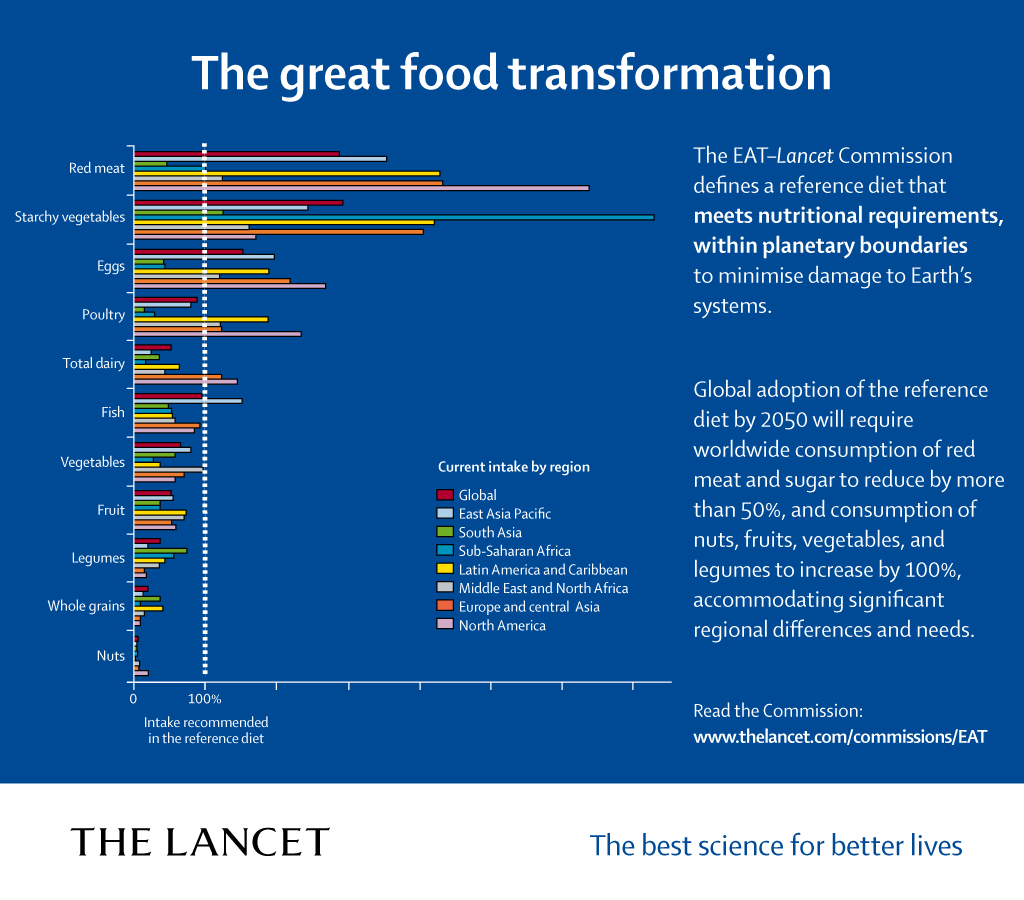
Putting the Planet on a Better Diet
 Civilization is in crisis, the Earth is at risk, and it’s time to put the planet on a better diet. So say Lancet editors Tamara Lucas and Richard Horton as they sum up findings of the EAT-Lancet Commission healthy and sustainable diets. They write:
Civilization is in crisis, the Earth is at risk, and it’s time to put the planet on a better diet. So say Lancet editors Tamara Lucas and Richard Horton as they sum up findings of the EAT-Lancet Commission healthy and sustainable diets. They write:
The dominant diets that the world has been producing and eating for the past 50 years are no longer nutritionally optimal, are a major contributor to climate change, and are accelerating erosion of natural biodiversity.
Big Changes Needed
It’s hard to deny. We have a global system for providing food that simply isn’t working. While more than 800 million people suffer from too little food, an abundant supply of food surrounds many more people with far more calories than they need. That means that we get endless cues to eat – everywhere, all the time, in large portions.
As a result, more and more of the world’s people are poorly nourished. Hunger and food insecurity remains a serious problem. But at the other end of the spectrum, over-nourishment has brought a global pandemic of obesity, diabetes, and many other chronic diseases.
Meanwhile, agriculture is straining to meet the dietary needs of the world’s population. Meat production is straining the health of the planet itself.
Don’t Mess with My Food
On top of these very real issues rests an even larger issue. The many are in no mood to hear from the few about how they must get with the program to solve big problems. All over the world, we have populist demagogues peddling simplistic solutions to complex problems.
For example, the yellow vest protest movement is transforming politics in France. One of the sparks was a hike in fuel taxes intended to help save the planet. What might the reaction be to mandate for cutting back on pommes frites and brie? Needless to say, America’s red states like their red meat. You can be sure that this commission’s recommendation to have a steak no more than once a month will go over like a lead balloon.
Mary Allen at the Good Food Institute sums it up. “No one is going to follow this advice,” she says.
People do not like being told what to eat. Telling the whole planet what to eat will be a challenge. Allen praises this report as “magical.” But we’ll need more than magical thinking to solve these problems.
Click here for the commission’s report and here for the Lancet editorial. For further perspective, click here, here, and here.
Earthbound, painting by Evelyn De Morgan / WikiArt
Subscribe by email to follow the accumulating evidence and observations that shape our view of health, obesity, and policy.
January 20, 2019

January 20, 2019 at 8:09 pm, David Brown said:
That is a long and complicated report. Sadly, the reference diet is derived from American Heart Association dietary dogma which is based on the soft science of epidemiological studies.
November 7, 2017 headline: “Obesity is rising in many countries, but so far none have been able to stop or reverse this trend.” https://www.healthline.com/health-news/obesity-rising-can-we-reverse-this-deadly-trend
August 2018 comment: “Obesity is preventable but there is still no single model for prevention and no country has managed to convincingly reverse the growing trend…”
Are the mainstream nutrition experts who supply the information used to formulate public policy missing something important? It would seem so.
In a 2013 review article entitled “Fatty Acid Modulation of the Endocannabinoid System and the Effect on Food Intake and Metabolism” the authors wrote, “Linoleic acid has been found to modulate endocannabinoid synthesis due to its ability to be converted to AA by the human body, although the effect of dietary linoleic acid on human endocannabinoid synthesis has not been investigated. This is a pertinent area of research due to the rapid increase in linoleic acid content in the Western diet as a result of a shift to plant-derived fats and the greater use of soy and corn oils in food production and manufacturing. These dietary changes have resulted in a shift in the n-3 to n-6 FA ratio, as reviewed by Simopoulos, with more than 84% of PUFA fats consumed in the USA being in the form of the AEA precursor linoleic acid. High linoleic acid diets promote obesity in both animals and humans and are correlated with increased fasting blood glucose, fasting insulin, and insulin resistance] in humans, making this an important area of further research. https://www.hindawi.com/journals/ije/2013/361895/
Of course, the “Soy Nutrition Institute” denies a connection between linoleic acid intake and any sort of health issue. Excerpt: “In conclusion, many factors undoubtedly contribute to the worldwide obesity epidemic. The argument put forth by Simopoulos and DiNicolantonio that a high omega-6 linoleic acid intake is the primary cause behind the American epidemic is currently not supported by the evidence.” https://thesoynutritioninstitute.com/linoleic-acid-not-to-blame-for-the-obesity-epidemic/
January 21, 2019 at 10:27 am, Allen Browne said:
We have to admit we do not know what is causing the dysfunction of our energy regulatory systems. Actually we are moving faster on how to treat than how to prevent – ironic.
Allen